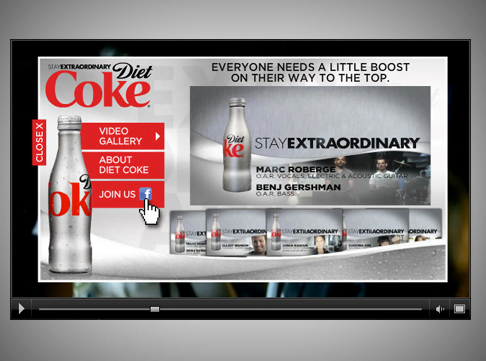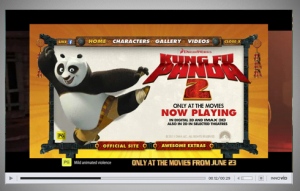As movies and television move increasingly toward online delivery, broadcast networks, movie studios and advertisers are all frantically searching for new ways to monetize their offerings. The usual solution is the “pre-roll” – the 15- to 30-second video advertisement that appears before a program starts. But even that’s not generating enough revenue.
Enter Tel Aviv-based Innovid, which just received a fresh infusion of $9.5 million in capital. Its goal: To turbo-charge the pre-roll.
The concept behind Innovid’s “iRoll” (the “i” is for “interactive”) is simple but effective. When a pre-roll plays, an interactive overlay appears on top. If you roll your mouse over it, a new screen pops up right in the video window with clickable options.
The pre-roll for the Seth Rogan comedy “Paul” lets you choose to view a gallery of photos, read a synopsis of the film, watch several trailers or buy tickets from the Fandango website. There’s even a Twitter box where you can tweet directly to your followers about what you’re “experiencing” in the ad.
Clicking on a pre-roll for more information about a movie or product is nothing new. But the trick with Innovid is that you never leave the video. With a standard pre-roll, you link to a separate landing page. “That disrupts the viewing experience,” explains Zack Zigdon, co-founder of Innovid.
It also increases the chances the viewer won’t see the ad – not exactly what its producer intended. An Innovid ad unit is like “a whole mini-site built into the pre-roll itself,” Zigdon says.
More clicks
Zigdon claims that an iRoll-enhanced ad garners “368% more engagement than a standard pre-roll.” In layman’s terms, if a link in a standard pre-roll is clicked, say, one percent of the time, a video ad using Innovid’s technology might be clicked up to 6%.
Ditto with time spent on the ad, where Innovid’s internal testing shows that viewers spend up to 200% more time watching the enhanced ad. For the “Paul” campaign, that translated into an average 40 seconds more. “That’s really ‘time earned,’” Zigdon says.
Clients may use Innovid’s tools to build their own iRoll, though about half opt to have the job done for them by Innovid’s Tel Aviv creative studio. The company’s R&D is based in Israel, while sales and marketing are run from the United States, which is the primary market.
Innovid has produced 300 campaigns in the past two years and runs tens of new campaigns every month. “We’re growing something like 30% month over month,” Zigdon says.
Sign up for our free weekly newsletter
SubscribeInnovid gets paid by CPM – the total potential number of views an ad might receive. That’s the same model used for the display ads all over the web. Innovid’s customers include publishers (such as CBS, NBC and CNN), leading brands like Coca-Cola, and ad agencies.
At first, publishers weren’t willing to build the integration technology required to run an iRoll campaign. But then Procter & Gamble told its publishers to get on board or they’d take their ad dollars elsewhere. Today, thanks to an interactive advertising standard, Innovid can run iRolls on some 80% of all publishers.
The company’s first business model, launched in 2007, was to insert custom content into live video. For example, if you were watching a football game, a billboard with an ad for Mercedes Benz could be inserted dynamically – it didn’t actually appear on the billboard in the stadium.
There were a number of problems with this model. Fortunately, the Innovid platform, which at its core allows the creative team to easily interact with the video, was transferable to the newer iRoll model, as were all the backend analytics, reports and streaming technology.
Self-serve pre-rolls
Innovid’s latest product, “iRoll Apps,” offers a much more self-service way to create interactive pre-rolls. The content creator can choose from a number of standard features – an image gallery, video component or ticket booking engine – and essentially drag and drop. The ad agency gives up some control, but the process is quicker and a lot cheaper.
Innovid’s latest investment round, its third, was led by Sequoia Capital in the VC firm’s first online video deal since YouTube. Other investors include Genesis Partners, Deutsche Telekom and T-Ventures. The company has raised a total of $17 million. Innovid plans to hire another 20 people (half in Israel) and open an office in London to promote sales in Europe. Asian sales will continue to be handled in Israel with Zigdon heading up the team.
Ironically, there are no iRoll campaigns running in Innovid’s home territory. Zigdon says we shouldn’t get the wrong idea. “We love Israel!” he emphasizes. “It just hasn’t been our focus — yet.”
Via MFA
Image courtesy Innovid
Related posts

Editors’ & Readers’ Choice: 10 Favorite NoCamels Articles

Forward Facing: What Does The Future Hold For Israeli High-Tech?

Impact Innovation: Israeli Startups That Could Shape Our Future






Facebook comments